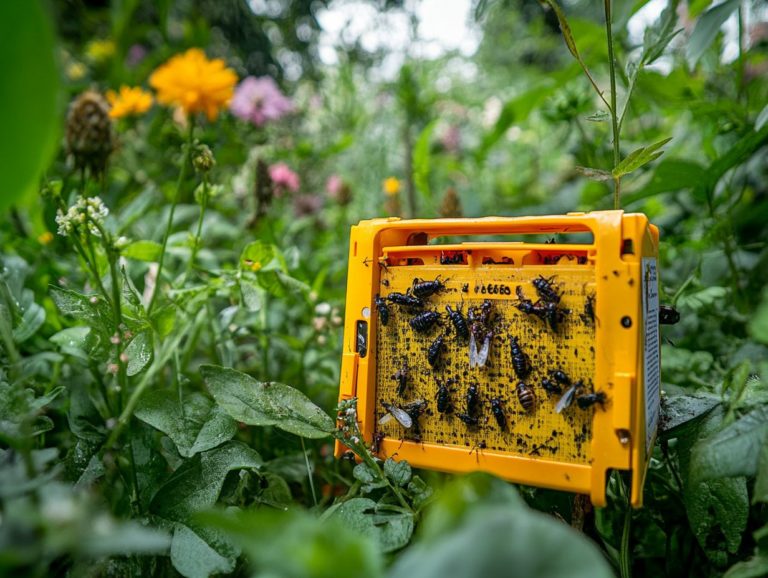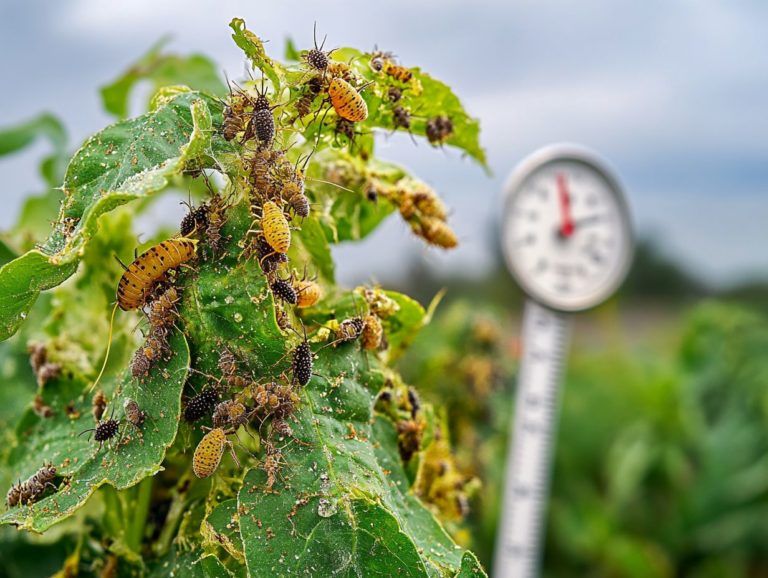Organic Pest Control: Myths vs. Facts
Organic pest control is emerging as a sophisticated, eco-friendly alternative to conventional chemical methods.
Let s clear up the myths surrounding organic pest control, showcasing its proven effectiveness and exploring natural alternatives to chemical pesticides.
We will guide you through implementing a successful organic pest control plan while highlighting the abundant environmental and health benefits it offers.
Explore how adopting an organic approach can revolutionize your pest management strategy!
Contents
- Key Takeaways:
- Understanding Organic Pest Control
- Myths about Organic Pest Control
- Facts about Organic Pest Control
- Organic Pest Control Methods
- Implementing an Organic Pest Control Plan
- Benefits of Organic Pest Control
- Frequently Asked Questions
- Is organic pest control just a myth or is it truly effective?
- Are there natural alternatives to chemical pest control, such as natural insecticides?
- Do organic pest control methods take longer to work than chemical pesticides?
- Are all pests harmful and need to be eliminated?
- Can I use organic pest control methods indoors?
- Is organic pest control more expensive than using chemical pesticides?
Key Takeaways:

- Organic pest control uses natural methods to eliminate pests, making it a safer and more environmentally-friendly option.
- Debunk common myths surrounding organic pest control, such as it being less effective and more expensive.
- Implementing an organic pest control plan involves using natural alternatives, proper monitoring, and promoting biodiversity to prevent future infestations.
Understanding Organic Pest Control
Knowing about organic pest control is crucial for homeowners seeking eco-friendly solutions that prioritize sustainable living and reduce environmental impact. This approach uses organic methods and natural products, such as neem oil and diatomaceous earth, to manage pests effectively while fostering a healthy living environment.
By adopting a method that combines different strategies to control pests effectively, you can make responsible choices that showcase the advantages of non-toxic alternatives to conventional chemicals, especially in regions like Virginia, Maryland, and Washington D.C.
What is Organic Pest Control?
Organic pest control encompasses a range of strategies and practices aimed at managing pests through natural products and methods rather than relying on conventional chemicals.
This approach embraces a holistic perspective on agriculture, emphasizing ecosystem health and sustainability. It requires a deep understanding of pest lifecycles and their natural predators, fostering a balanced environment where beneficial insects can thrive.
In your organic pest management efforts, consider using chemical alternatives derived from natural sources, such as neem oil and diatomaceous earth. These options effectively deter unwanted pests while posing minimal risk to both humans and pets.
By incorporating these natural products into your pest control strategies, you can cultivate healthy crops and enhance biodiversity, ultimately contributing to more resilient agricultural systems.
Myths about Organic Pest Control
You may encounter several prevalent misconceptions that might prevent you from seeing its effective solutions and the professional services available in the industry.
These myths often deter homeowners like you from embracing eco-friendly pest control methods that are not only efficient but also significantly safer for both the environment and your health.
Debunking Common Misconceptions
One common misconception is the belief that organic pest control is less effective than traditional methods. In reality, this couldn’t be further from the truth; organic pest control offers powerful solutions for a range of pest issues.
Numerous studies have shown that organic techniques like utilizing beneficial insects and natural repellents can deliver results that are not only comparable but often superior in managing pest populations. For example, a case study from an organic farm revealed that after adopting these methods, the farm experienced a remarkable reduction in pests, along with enhanced crop health and yield.
Farmers who have transitioned to organic practices often share testimonials highlighting how they safeguard their crops while positively contributing to a healthier ecosystem. This real-world evidence effectively dispels the myth surrounding organic pest control and showcases its potential as a truly viable solution.
Facts about Organic Pest Control

Organic pest control stands out for its proven effectiveness and safety, making it an increasingly attractive option for those who prioritize sustainable and healthy living.
If you’re considering organic pest control options, don t hesitate to reach out to professionals for guidance and support!
Proven Effectiveness and Safety
Research has demonstrated that organic pest control methods, including natural insecticides and integrated pest management (IPM), offer both proven effectiveness and safety for your gardening endeavors.
Numerous studies highlight how these techniques can efficiently manage pest populations while minimizing harm to beneficial organisms and the environment. For instance, a 2016 study published in the Journal of Organic Agriculture revealed that using beneficial insects like ladybugs and lacewings, paired with natural insecticides, significantly reduced aphid populations without the need for toxic chemicals.
The USDA found that farms implementing integrated pest management strategies enjoyed a remarkable reduction in pesticide use up to 50% leading to healthier soils and enhanced biodiversity. Such compelling evidence emphasizes the potential of these organic methods, making them increasingly attractive to environmentally conscious farmers and gardeners like you.
Organic Pest Control Methods
Organic pest control methods present a variety of natural alternatives to chemical pesticides, emphasizing integrated pest management techniques that effectively deter pests while promoting ecological balance.
By choosing these approaches, you not only protect your environment but also embrace a more sustainable way to manage pest challenges.
Natural Alternatives to Chemical Pesticides
Natural alternatives to chemical pesticides include a variety of products such as neem oil and diatomaceous earth, which are essential components of organic pest control strategies. These natural solutions utilize the inherent properties of plants and minerals to repel pests without the harmful side effects commonly associated with synthetic chemicals.
Neem oil, for example, is extracted from the seeds of the neem tree and functions by disrupting the life cycle of insects. This reduces their reproductive capabilities, ultimately leading to a decline in their populations. On the other hand, diatomaceous earth is a powder made from tiny fossilized plants that can harm insects by drying them out.
Both of these alternatives not only target a wide variety of pests but also contribute to enhanced soil health, promoting a balanced ecosystem. Through effective organic pest management, you can embrace these methods as a sustainable pathway, advocating for a healthier approach to agriculture that benefits both farmers and gardeners alike.
Implementing an Organic Pest Control Plan
Implementing an organic pest control plan requires you to thoughtfully choose pest control products while employing prevention techniques. This approach not only fosters a pest-free environment but also promotes a healthier ecosystem.
Steps for Success

To achieve success with your organic pest control plan, you ll want to follow some key steps: thorough inspection, smart product selection, and ongoing monitoring.
Each of these steps is essential for ensuring your plan s effectiveness and sustainability. Starting with a meticulous inspection allows you to catch pest issues early, enabling you to make targeted interventions instead of resorting to blanket treatments.
Next, choosing the right organic products like neem oil or insecticidal soaps ensures that your solutions are safe for both your plants and the beneficial insects you want to protect.
An ongoing monitoring strategy is vital; it not only tracks the effectiveness of your chosen methods but also helps you spot any new pest pressures that may arise. By implementing these best practices, you can cultivate a balanced ecosystem while effectively managing pest problems in an organic way.
Benefits of Organic Pest Control
Organic pest control does so much more than just keep pests away it helps our planet! The advantages go far beyond merely managing pests; they provide substantial environmental and health benefits that resonate with a commitment to responsible and sustainable living choices.
Start your organic pest control journey today and be part of the solution for a healthier planet!
Environmental and Health Benefits
Organic pest control offers remarkable environmental advantages, such as reduced chemical runoff and enhanced biodiversity. These methods also provide significant health benefits for both humans and wildlife.
By employing natural predators and organic materials, you can cultivate healthier ecosystems that support beneficial insects, birds, and other wildlife. This approach decreases exposure to harmful chemicals, which can lead to respiratory issues and neurological disorders. It also lowers the likelihood of pests developing resistance to pesticides.
A study by the Organic Trade Association reveals that organic farming can increase species variety by an impressive 30% compared to conventional practices. Organic pest control also promotes cleaner waterways, as organic crops typically have lower pesticide residues, maintaining a safer habitat for aquatic life.
Together, these advantages show how organic approaches contribute not just to food safety but also to the overall health of ecosystems.
Frequently Asked Questions
Is organic pest control just a myth or is it truly effective?
This is a common misconception. Organic pest control is a proven and effective method of managing pests without harmful chemicals.
Are there natural alternatives to chemical pest control, such as natural insecticides?

Absolutely! Many organic and natural methods can effectively control pests, such as using essential oils, diatomaceous earth, and beneficial insects.
Do organic pest control methods take longer to work than chemical pesticides?
While organic pest control may take slightly longer to show results, it is a safer and more sustainable option for long-term management. Plus, it can be just as effective as chemical pesticides.
Are all pests harmful and need to be eliminated?
No, not all pests are harmful. Some can be beneficial to our gardens and ecosystems. With organic pest control, you can effectively manage pests while preserving your garden’s health!
Can I use organic pest control methods indoors?
Yes, many organic pest control methods can be used indoors, such as vacuuming, sealing cracks and crevices, and using natural repellents like peppermint or neem oil.
Is organic pest control more expensive than using chemical pesticides?
Initially, organic pest control methods may be slightly more expensive due to the cost of natural ingredients. However, in the long run, it can save money by reducing the need for repeated treatments and potential health costs associated with chemical pesticides. This reinforces the case for professional services in pest control.
Ready to make the switch to organic pest control? Explore our resources and discover how you can create a healthier home and environment!






